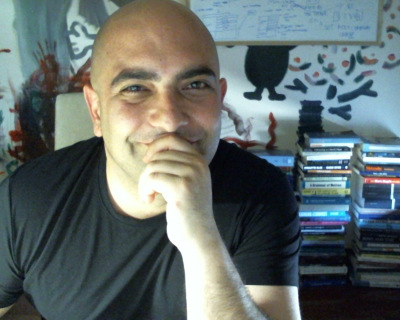
|
|
Abstract: An outsider's view of Bahá'í history and ideology (doxa). Notes: See also Martinez's thesis. Mirrored from obervatoriorrii.wordpress.com. |
Bahá'ísm hopes to unite the world and religious conflicts:
An interview with Hutan Hejazi Martinez
by Linn Andersson
published in Observatorio para las Relaciones Internacionales2012-05-10
Andersson: How did the idea to this book start?
 click for larger image |
Andersson: After skimming through your book I got the impression of that this religion is quite complex and nothing you get to understand over a coffee break but could you try explaining the main idea of it?
Hejazi Martinez: Well, Baha’i is a growing religion that emerged from the Islamic branch of Shiite in Persia, today’s Iran, during the Quejar dynasty, in the middle of the 19th century. The religion is constructed around so called “communities” from local levels to the “Universal House of Justice”. Every level has a government consisting of 9 democratically chosen spiritual leaders where both women and men are accepted as equal leaders as men. For the Universal house of Justice are only men are allowed, though. They have several holy Scriptures but one “The book of Law” is superior all the others. Baha’i believes in a superior power but with more focus on the personal spiritual development to something better rather than submission and penance through punishment. Nevertheless it has a lot in common with the main world religions where prophets like Jesus, Muhammad, Moses and Buddha are considered as “messengers” and other important persons like Peter, Mark and Ali are “guardians” of Baha’i Faith. This movement is kind of a mix of different grasps of other religions, which makes it fairly accepting and opened, I think. The ideology or doxa was created by the modern messenger Báb and further developed by Bahá’u’lláh. The whole religious culture were soon exiled from Iran owe to the Shah and the Shia leaders disapproval of another religious values. The early Baha’is found a sanctuary in Haifa in Israel and from there Baha’i Faith spread to Europe, America and further.
Andersson: What does Baha’i look like in Iran today?
Hejazi Martinez: The Baha’i minority in Iran is living a quite complicated life hence their connections with Haifa and Israel. The delicate matter between Israel and Iran as well as the Baha’i’s history in Iran has resulted in the Iran government preventing Baha’i students attending public education, for example. But surly it still exist Baha’i believers even though temples and Baha’i based celebrations are kept in quiet. I recently red an article about Baha’is turning to the UN for support due to the Iranian treatment of their religious minority. That shows quite clearly the Baha’is situation in their home country.
Anderson: Baha’i Faith sounds quite open-minded hence the equalization of other religion’s messengers with Báb, but since the religion sprung out from Shi’ism shouldn’t it be accepted as just a branch of Islam?
Hejazi Martinez: Baha’i was in sociological terms considered as a Shi’ite sect but has lately been accepted as an independent religion. It has its grasps from Islam, for example a type of Lent reminding of Ramadan and the Iranian new year Nowruz. Nevertheless, the cycle of life and death in Baha’i Faith is a bit different to Islam. Baha’is believe in eternal life but not through reincarnation. Instead you proceed to another world after death and your spirit continues in in another world and after that another in all eternity. This gives a chance of virtual and spiritual development through each new world for each soul. So this religion has its type of love message like any of the world religions, that love and care for others is one of the main achievement one should aim for. Still, Baha’i Faith has its disadvantages, for example the fact that females are accepted as equal men in the spiritual sphere except in the Universal House of Justice is indeed contradictory. And as to homosexuality and promiscuity a Baha’i don’t look upon it without inconvenience. Nevertheless we’re not talking about an exclusion from the society for having another sexual orientation, these kinds of discussions are simply kept in quiet.
Andersson: So maybe Baha’ism the best solution for agnostics or people that’s still searching?
Hejazi Martinez: (Laughs) Maybe so, considering the fact that it has gained 6 million followers during its few 166 years of existence, imagine what it can achieve in the next 150 years! I actually think that this religion has a future potential to grow, in numbers, within the next 100 years. A Baha’i's reason to exist is that he wishes to unite the world, not least the religious one. To recognize other religions attributes in yours shows a fairly open minded perspective and it regains in an openness to factors that normally exclude rather than unite people such as ethnicity, religion, culture and so forth.So why not. If agnostics struggle with what to believe in but are aiming for some kind of divine answers why not Baha’i that includes a bit from all the main world religions and foremost Islam, Judaism and Christianity. That sounds like a sound conclusion.
About the author: Hutan Hejazi Martínez is a social and cultural anthropologist. He is a Professor of Social and Economic Thought, and Advocacy Groups, currently teaching at Universidad Europea de Madrid. He was born in Iran, grew up in Spain, spent time in Check Republic and moved to the U.S at the age of 18. In 2011 Hejazi’s book, Baha’ism: History, Transfiguration, Doxa was published. It is based on his research for his Ph.D. at Rice University.
|
|